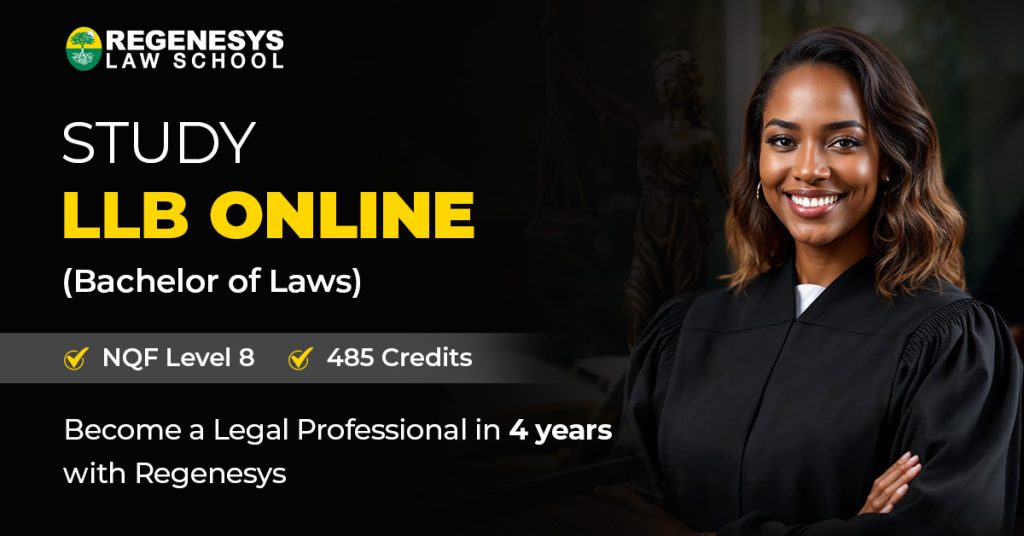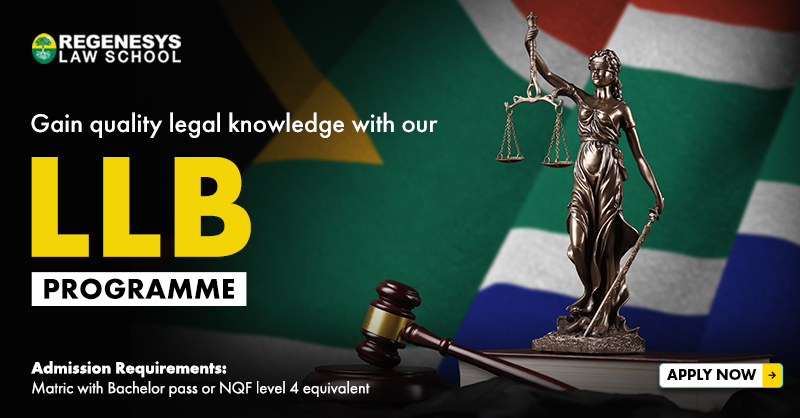Wondering if the LLB is worth it in South Africa? This in-depth guide explores the real value of an LLB Degree in SA, from career opportunities and salary potential to curriculum structure and job market demand. Whether you’re considering a legal career in SA or asking “should I study law in SA?”, this article covers everything you need to know, including LLB careers in South Africa, admission criteria, study modes, and top employers hiring law graduates.
Table of Contents
- What is an LLB Programme?
- Why Study LLB in South Africa?
- Course Curriculum & Duration
- LLB Admission Requirements: Who Qualifies to Study?
- Career Opportunities After LLB
- Top Employers Hiring LLB Graduates
- LLB vs Other Qualifications
- Study Mode Options
- Fees & Funding Options
- Conclusion
- Is LLB Valuable in South Africa? – FAQs
What is an LLB Programme?
The Bachelor of Laws (LLB) is a four-year undergraduate degree (NQF Level 8) comprising 485 credits. It forms the academic foundation required for becoming an attorney or advocate in South Africa. The programme develops a deep understanding of legal concepts, judicial systems, ethics, and practical legal applications.
At Regenesys Law School, the LLB combines theory with hands-on experience through case studies, simulations, and legal research. This helps students build critical thinking, problem-solving, and analytical skills, which are essential tools for any legal career in SA.
The LLB doesn’t only prepare you for courtrooms. It opens up a range of professional pathways, including corporate legal practice, academic research, public administration, and more. It is both an academic and professional qualification, giving graduates the credibility and competence to operate in legal or related environments.
The following are key highlights of the Regenesys Law programme
- Qualification Type: Bachelor’s Degree
- NQF Level 8
- Duration: 4 years
- Study Mode: Online and Contact
- SAQA ID: 119076
The LLB law programme stands as a solid investment for students who are passionate about justice and societal change, making the LLB worth it in South Africa for the right candidates.

Why Study LLB in South Africa?
Choosing to pursue an LLB Degree is not just a personal or academic decision; it also reflects an understanding of societal needs and career longevity. South Africa’s legal landscape is constantly evolving, and trained legal minds are required across both the public and private sectors.
Listed below are some reasons why the LLB is worth it in South Africa:
1. Industry Demand:
There is a rising demand for skilled legal professionals across various industries in South Africa. This includes traditional law firms, but also extends to compliance, corporate governance, public service, and NGOs.
Here are some reasons why the LLB is valuable in South Africa:
- Growing Demand: South Africa continues to face complex legal challenges that require skilled lawyers to resolve. With constitutional law, human rights law, and environmental law all gaining focus, LLB graduates are in demand.
- Legal Reform: Ongoing transformation within the justice sector means there is a growing need for diverse and well-educated legal professionals.
- Public & Private Sector Needs: Government departments, corporations, and non-profits increasingly require in-house legal professionals for regulation, negotiation, and compliance purposes.
All these factors contribute to why the LLB is worth it in South Africa for those seeking a meaningful and stable career.
2. Career Relevance:
Studying law isn’t just about learning the rules – it’s about understanding how to use them to create change and resolve disputes. The career opportunities that come with an LLB are both meaningful and varied.
Key benefits of choosing an LLB Programme in South Africa include:
- Professional Credibility: The LLB is the minimum academic requirement to practise as an attorney or advocate in South Africa. It opens the door to professional legal registration.
- Diverse Careers: From litigation and policy advising to compliance and arbitration, LLB holders can explore several career options.
- Long-Term Value: The LLB holds value beyond just a job. It builds lifelong skills like argumentation, ethics, negotiation, and logic.
If you’re still wondering whether the LLB is worth it in South Africa, consider its ability to equip you with the tools needed for both career success and societal impact.
Know The Demand for a Bachelor of Laws (LLB) Degree in South Africa here

Course Curriculum & Duration
The LLB curriculum is structured to ensure a thorough understanding of the law in both South African and international contexts. The programme blends academic study with practical learning, offering a holistic legal education. So, while exploring whether LLB is worth it in South Africa, you must know its curriculum and duration.
Here’s an overview of what to expect in terms of curriculum and structure:
- Duration: 4 years (full-time)
- Credit Load: 485 credits
- Study Options: Online / contact learning
Common modules include:
- Family Law – Covers legal aspects of marriage, divorce, and child custody.
- Law of Persons – Focuses on legal personality, status, and capacity.
- Constitutional Law – Examines the structure and function of theConstitution.
- Law of Contract – Covers general and specific contract principles.
- Law of Delict – Focuses on wrongful acts and legal liability.
- Criminal Law – Introduces criminal offences and justice procedures.
- Labour Law – Explores employment law and labour dispute processes.
With its mix of theoretical and practical components, the curriculum makes the LLB worth it in South Africa for students looking to be job-ready from the start.
Read on Navigating the Challenges of a Bachelor of Laws Programme (LLB) here!
LLB Admission Requirements: Who Qualifies to Study?
Before applying for an LLB, it’s important to understand the requirements that qualify you for the programme. Admission into an LLB programme depends on several factors, including your academic background, level of study, and in some cases, your work experience.
Understanding these requirements not only ensures a smooth application process but also helps prospective students align their academic goals with the expectations of legal education in South Africa.
Listed below are the eligibility criteria for the Regenesys LLB programme:
- Matric with Bachelor pass or NQF level 4 equivalent qualification
- English 1st – 50% | English 2nd – 60%
- A levels for International students (Africa)
- Higher level pass for international students 26 APS
- Competent in Mathematics, English, written and oral communication skills at NQF Level 4
- Basic computer skills, internet connection and relevant IT resources
These criteria ensure that students are academically and technically equipped to handle the rigorous demands of the LLB law programme.
Read on LLB: The Importance of Legal Training in Society here!
Career Opportunities After LLB
An LLB degree opens up diverse career paths in South Africa’s legal and corporate sectors. Whether in courtrooms, compliance, or advisory roles, the qualification equips graduates with valuable, in-demand skills. So, as you find out if LLB is worth it in South Africa, explore some of the most common roles and industries for graduates.
Common Job Roles
The LLB unlocks multiple career doors. Graduates can practise law in courts, advise businesses, influence policy, or even pursue academic careers.
Below are popular LLB careers in South Africa:
- Law Professor or Teacher: Educates students in legal theory and practice, often contributing to academic research and publications.
- Legal Adviser: Provides legal counsel to clients or organisations, ensuring decisions comply with current laws and regulations.
- Legal Assistant: Supports legal professionals by managing files, preparing documents, and coordinating case-related tasks.
- Legal Journalist: Reports on legal issues, court cases, and policy changes, making legal news accessible to the public.
- Legal Researcher: Conducts in-depth legal research to support policy development, academic work, or legal proceedings.
Industries Hiring
The diversity of industries that hire law graduates shows the wide-ranging utility of an LLB degree. The following are the top industries that hire LLB graduates:
- Legal Firms: For litigation, consultation, and contracts.
- Financial Services: Legal compliance, risk management, and contract review.
- Government Departments: Policy development, public litigation, and advisory.
- NGOs: Advocacy, legal research, and public interest law.
- Corporate Sector: Regulatory compliance, legal strategy, and internal audits.
Find out Is Law A Good Career For The Future? Know Demand and Growth here!
Top Employers Hiring LLB Graduates
An LLB qualification opens the door to a wide range of legal career opportunities in South Africa. These roles range from litigation and legal advisory to compliance, corporate governance, and human rights advocacy. Graduates are in demand across both the private and public sectors, with roles available in litigation, compliance, advisory services, and more. Many organisations value the critical thinking, research, and communication skills developed during an LLB programme.
The legal field also offers roles in academia, legal research, and policy development, depending on the graduate’s interests and career goals.
Here are some top companies hiring LLB graduates in South Africa:
- Webber Wentzel
- Bowmans
- ENSafrica
- LegalWise
- FNB Legal Division
- Department of Justice and Constitutional Development
- Norton Rose Fulbright
- Werksmans Attorneys
- Human Rights Commission SA
- Legal Aid South Africa
These employers span both private and public sectors, showcasing the breadth of LLB opportunities in the country.
LLB vs Other Qualifications
When comparing the LLB with other law-related qualifications, a clear comparison can help you choose the best fit for your goals. For those wondering if the LLB is worth it in South Africa, this section clarifies how it differs in value, duration, and career outcomes when compared to shorter legal courses such as aParalegal Qualification.
The table below offers a comparison between the Regenesys LLB programme and the Paralegal Qualification:
|
Feature |
LLB Programme |
Paralegal Qualifications |
|
Duration |
4 Years |
2 Years |
|
Entry Criteria |
Matric with Bachelor pass of NQF Level 4 equivalent |
NQF 4 qualification or 3 years of experience in the legal sector |
|
Career Outcome |
Advocate, Attorney, Legal Adviser |
Paralegal |
|
Best For |
Those wanting full legal practice |
Support roles in law firms |
The LLB is ideal for individuals seeking full legal authority and higher earning potential, while a diploma is suited for administrative legal support roles.
Explore Types of Law Degrees Available in South Africa here!
Study Mode Options
Today’s students value flexibility more than ever, especially when balancing studies with work or personal commitments. The LLB programme in South Africa is designed to meet these needs, offering multiple study options to suit different lifestyles. Whether you’re a full-time student, a working professional, or returning to studies later in life, the LLB can fit into your routine.
Available study modes include:
- Online Learning: Study from anywhere with internet access – perfect for remote learners or those with busy schedules.
- Contact Classes: For students who prefer face-to-face learning in a traditional classroom environment.
This flexibility makes the LLB worth it in South Africa, especially for mature students or working adults.
Fees & Funding Options
Pursuing an LLB is a significant academic and financial commitment. While fees may differ between institutions and study modes, several funding solutions are available to support your journey.
At Regenesys, we are committed to making quality legal education accessible. That’s why we offer a range of flexible student funding options in partnership with trusted finance providers like Student Hero, Fundi, Capitec, and Nedbank. These partners assist students in applying for and comparing education loans at no extra cost.
Additionally, our FlexiPay plan allows students to spread tuition payments over manageable terms, providing greater convenience and clarity.
Note: Financial support is subject to eligibility and availability. Students are encouraged to explore both internal and external funding opportunities.
Know more about our Student Loans here

Conclusion
If you’re still wondering, “Is the LLB Programme worth it in South Africa?”, the answer lies in the opportunities it creates. The LLB remains a key qualification for entering the legal profession and is highly regarded across sectors like business, government, and civil society. It not only prepares you for roles such as attorney or legal adviser but also builds essential skills in analysis, communication, and ethical reasoning.
At Regenesys Law School, the Bachelor of Laws Programme is designed to align with South Africa’s legal needs through practical learning, flexible study modes, and expert guidance, making it a smart and purposeful choice for your future.
Ready to begin your journey in the legal field?
Enquire Now or Apply Today to join the LLB Programme.
Is LLB Valuable in South Africa? – FAQs
Is LLB worth it in South Africa?
Yes. An LLB is a valuable qualification that opens up numerous legal and corporate career paths. It is highly respected and aligns with national development needs.
Can I study LLB part-time or online?
Yes. Many institutions, including Regenesys Law Schoo,l offer LLB online in South Africa, making it suitable for working professionals.
What is the career path after LLB?
You can pursue roles such as attorney, advocate, legal adviser, or go into academia and public service.
How long does it take to complete an LLB in South Africa?
The standard LLB programme in South Africa takes four years to complete if studied full-time.
Should I study law in SA if I’m interested in justice?
If you are passionate about justice, governance, and human rights, then yes, the LLB is a strong fit.







